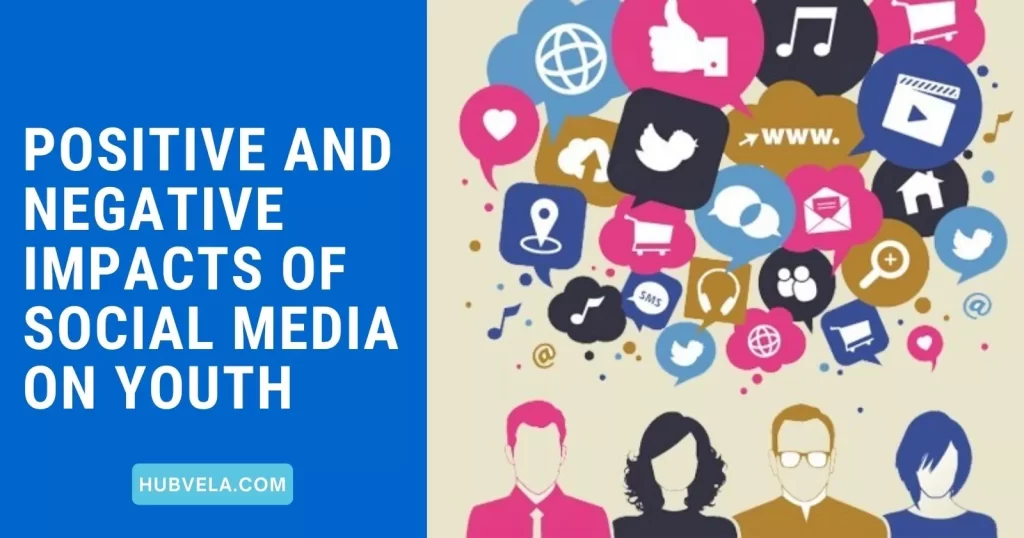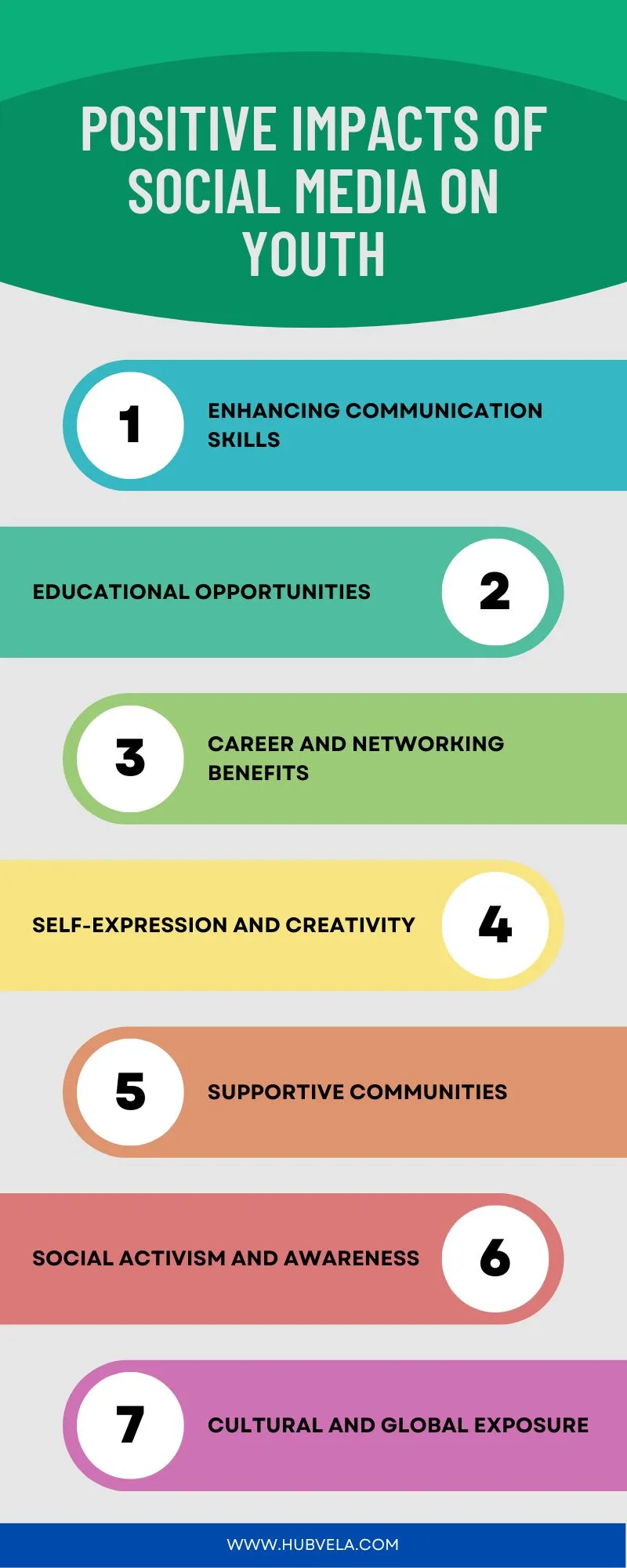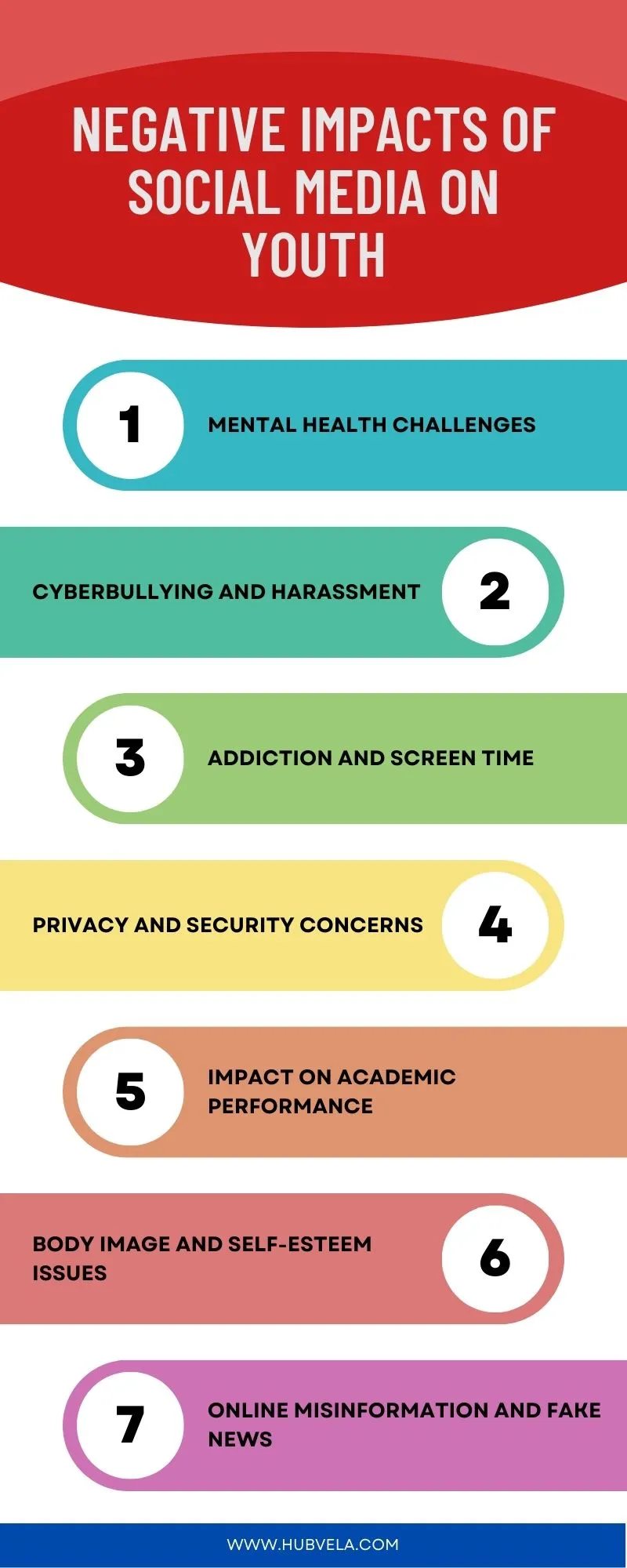Social media has become an integral part of modern society, and its impact on youth has been a topic of much debate.
While social media can have positive effects on youth, such as helping them feel more connected to their friends and family, it can also have negative effects on their mental health and well-being.
The impact of social media on youth can be significantly detrimental to mental health, exposing teens to cyberbullying, body shaming, and other harmful content.
In addition, social media can limit direct contact with peers, disrupting sleep patterns, and exposing teens to unrealistic views of other people’s lives.
On the other hand, social media can also help teens build social networks, provide valuable support, and teach them about a variety of subjects.
In this article, we will explore the positive and negative impacts of social media on youth, and how parents and caregivers can help limit the negative impact of social media use on their teens.

--Advertisement--
Positive Effects of Social Media on Youth
In today’s digital age, social media has become an integral part of the lives of young people. While there is often a focus on the negative effects of social media on youth, it is important to recognize that there are also positive aspects to its use.
Social media platforms provide a means for teenagers to connect with others, express themselves creatively, and learn about the world around them.
Research has shown that social media can have several positive effects on youth, empowering them and enhancing their overall well-being. By understanding and harnessing these positive effects, we can help young people thrive in the digital world.

1. Enhancing Communication Skills
One of the positive effects of social media on youth is the enhancement of communication skills. Social media platforms provide a space for young people to connect and interact with others from different backgrounds and cultures.
Through online conversations, youth can develop their ability to express themselves effectively, engage in meaningful discussions, and learn how to navigate different perspectives.
Social media also offers opportunities for collaboration and teamwork, as young people can join groups or communities centered around shared interests or causes.
By participating in these online communities, youth can practice their communication skills, learn to work with others, and develop important interpersonal skills that can benefit them in various aspects of their lives.
Additionally, social media platforms often provide features such as messaging, video calls, and voice chats, which allow youth to communicate in real time and build relationships with others, even if they are physically distant.
Social media can serve as a valuable tool for young people to enhance their communication skills and foster meaningful connections with others.
2. Educational Opportunities
Social media has opened up new educational opportunities for young people. According to a Georgetown University article, social media empowers parents, students, and teachers to use new ways of sharing information and building a community.
The article also states that 96% of students with internet access use at least one social network. Social media provides the latest data on various school subjects, and students can survey and look into what is new.
Social media can also help improve literacy, communication, and reading skills. Social media can offer distance learning opportunities for disadvantaged students who are not able to attend school.
Social media can also provide informal learning opportunities for young people, allowing them to pursue their interests and learn about different topics and groups.
Social media can be a valuable tool for young people to enhance their education and learning experiences.
3. Career and Networking Benefits
Social media provides young people with opportunities to build their professional networks and explore potential career paths. LinkedIn is a valuable tool for career management and networking.
LinkedIn offers a variety of ways to expand your network by finding and connecting with relevant professionals in your industry. Social media platforms also allow young people to showcase their skills and talents, which can attract potential employers and clients.
Social media can also provide access to job opportunities and career resources, such as job postings and career advice.
By using social media strategically, young people can connect with relevant professionals, discover new opportunities, and build their careers.
Social media can be a valuable tool for young people to explore their career options, build their professional networks, and showcase their skills and talents.
4. Self-Expression and Creativity
Social media provides young people with a platform to express themselves creatively and showcase their talents.
Social media platforms like Instagram and TikTok can encourage more people to create original and authentic content by providing a space to share their creativity with the world.
Social media allows young people to fearlessly express themselves through words and arts in ways they may not dare to do in real life. Furthermore, this content has the potential to reach millions of individuals all around the world.
Social media has become an increasingly significant medium for showcasing the work of both professional and amateur artists, allowing them to quickly share their artwork with a broad and diverse audience, interact with potential purchasers, and establish a loyal following.
Social media also provides young people with the opportunity to pursue their interests and learn about different topics and groups. Social media can be a valuable tool for young people to express themselves creatively and pursue their passions.
5. Supportive Communities
Social media can provide young people with supportive communities that can benefit their mental health and well-being.
Social media can serve as a tool to enable youth to connect with a social community, thereby benefiting psychologically from the gained social capital.
Social media can offer a sense of belonging and connectedness to peers, which can help reduce feelings of loneliness and isolation.
Social media can also provide a space for young people to receive emotional support and encouragement from others, which can help them cope with stress and difficult situations.
Social media can also provide a platform for young people to share their experiences and connect with others who have similar interests or experiences.
Social media can be a valuable tool for young people to build supportive communities and foster positive mental health outcomes.
6. Social Activism and Awareness
Social media has become a powerful tool for social activism and awareness, especially among young people.
Eight in ten Americans believe that social media platforms are effective for raising public awareness about political or social issues, and a similar share believes that these platforms are effective for creating sustained social movements.
Social media can be used to organize large-scale protests and document them. Social media can also be used to spread awareness of the mission, needs, and existence of an issue, and create a platform for sharing stories.
Social media can also be used to connect with others who have similar interests or experiences.
However, social media can also be a distraction and lull people into believing they are making a difference when they are not. Social media can be a valuable tool for young people to engage in social activism and raise awareness about important issues.
7. Cultural and Global Exposure
Social media has the potential to expose young people to different cultures and perspectives from around the world. Social media encourages our global community’s association and interconnecting across cultures.
Social media can provide a platform for young people to learn about different cultures, languages, and customs, and connect with people from different backgrounds.
Social media can also provide a space for young people to share their experiences and connect with others who have similar interests or experiences.
By engaging with diverse content and communities on social media, young people can broaden their horizons and develop a more nuanced understanding of the world around them.
However, it is important to note that social media can also perpetuate stereotypes and biases, and young people should be mindful of the sources of information they consume and the perspectives they engage with.
Social media can be a valuable tool for young people to explore different cultures and perspectives and develop a more global outlook.
Negative Effects of Social Media on Youth
Social media has become an integral part of the lives of many young people today. While it has its benefits, such as allowing teens to connect with friends and family across geographic barriers and teaching them about a variety of subjects, including healthy behaviors, it also has negative effects on youth.
The impact of social media on teenagers can be significantly detrimental to their mental health, exposing them to cyberbullying, body image issues, and sleep deprivation.
Additionally, social media use can distract teens, disrupt their sleep, and expose them to bullying, rumor spreading, unrealistic views of other people’s lives, and peer pressure. We will explore the negative effects of social media on youth in more detail.

1. Mental Health Challenges
While social media can have positive effects on youth, it can also have negative effects on their mental health. Social media usage among adolescents may affect their mental health.
The use of social media and depression in teens are “generally correlated”; however, there have been inconsistent results in certain areas, such as the relationship between time spent on social media and mental health issues, and the quality of the data is generally low.
Using social media may increase the risk of self-harm, loneliness, and a decrease in empathy, based on particular studies.
Furthermore, overuse of social media exposes teens to cyberbullying, body image issues, and tech addiction, and results in less time spent doing healthy, real-world activities.
Social media can also contribute to depression, anxiety, loneliness, and FOMO (fear of missing out).
However, social media can also provide a space for young people to receive emotional support and encouragement from others, which can help them cope with stress and difficult situations.
Social media can have both positive and negative effects on the mental health of young people, and it is important to use it mindfully and in moderation.
2. Cyberbullying and Harassment
One of the negative effects of social media on youth is the prevalence of cyberbullying and harassment. 59% of U.S. teens have personally experienced at least one of six types of abusive online behaviors.
Cyberbullying can take many forms, including name-calling, rumor-spreading, and harassment based on appearance, gender, or other personal characteristics.
Adolescent girls are just as likely, if not more likely than boys to experience cyberbullying (as a victim and offenders). Cyberbullying can have serious consequences for young people’s mental health, including increased risk of depression, anxiety, and suicidal ideation.
Social media can also expose young people to harassment and hate speech from strangers and online communities, which can be distressing and traumatic.
It is important for young people to be aware of the risks of cyberbullying and harassment and to take steps to protect themselves, such as reporting abusive behavior and blocking or unfollowing individuals who engage in harmful behavior.
3. Addiction and Screen Time
Social media can be designed to be addictive, and this can lead to negative effects on youth. Social media platforms are designed to drive surges of dopamine to the brain to keep users coming back over and over again.
This can lead to excessive screen time and addiction, which can have negative effects on mental health, including anxiety, depression, and loneliness.
A study published in the National Center for Biotechnology Information found that social media use can also negatively affect teens, distracting them, disrupting their sleep, and exposing them to bullying, rumor spreading, unrealistic views of other people’s lives, and peer pressure.
However, social media can also provide entertainment, self-expression, and a meaningful connection to peers and a wide social network, which might even help teens avoid depression.
It is important for young people to be mindful of their social media use and to take steps to limit screen time and prioritize real-world activities.
4. Privacy and Security Concerns
One of the negative effects of social media on youth is the potential privacy and security concerns that arise from using these platforms. Social media platforms collect and store vast amounts of personal information, making users vulnerable to various risks.
Unauthorized access to social media accounts can lead to stolen information, forced shares of malicious content, and even identity theft. Additionally, social media platforms can be attractive targets for bad actors seeking to exploit personal data for fraudulent activities.
Concerns about privacy and data protection have been on the rise, with users worrying about advertisers and businesses accessing their shared data.
It is crucial for young people to be aware of the privacy settings and security measures provided by social media platforms and to exercise caution when sharing personal information online.
Being mindful of privacy and security concerns can help protect youth from potential risks associated with social media use.
5. Impact on Academic Performance
The impact of social media on the academic performance of youth is a topic of concern. While social media can provide educational opportunities and access to information, it can also have negative effects on academic performance.
Research suggests that excessive use of social media can lead to distractions, reduced attention span, and decreased cognitive abilities, ultimately affecting academic engagement and performance.
Studies have shown that students who spend more time on social media tend to have lower academic achievement. The constant availability of social media platforms can lead to procrastination and time mismanagement, taking away valuable study time.
Additionally, social media can contribute to sleep disturbances, which can further impact academic performance.
It is important for young people to find a balance between social media use and academic responsibilities to ensure that their academic performance is not negatively affected.
6. Body Image and Self-Esteem Issues
Social media can have a significant impact on the body image and self-esteem of young people. Many students have expressed that social media has been detrimental to the way they feel about their looks, leading to comparisons with the people they see online.
The constant exposure to images of seemingly perfect faces and bodies on social media can create unrealistic beauty standards, contributing to body dissatisfaction and low self-esteem.
Research has shown a correlation between time spent on social media and negative body image, especially when scrolling through appearance-related content. The influence of social media on body image is particularly concerning for individuals vulnerable to eating disorders.
However, it is important to note that social media can also provide a platform for body positivity, community support, and health and fitness inspiration.
Understanding the impact of certain content on body image can help individuals make informed choices about the profiles and platforms that best support their well-being.
7. Online Misinformation and Fake News
Social media can be a breeding ground for online misinformation and fake news, which can have negative effects on youth. With so many sources of information online, it has become difficult to make sense of what content is based on facts, half-truths, or lies.
The use of digital platforms to share things we believe to be true when they may not be can have a powerful ripple effect, influencing others to see them as facts.
This can be especially dangerous for children and young people who can be persuaded to take on distorted views of the world that could cause them or others harm in the real world.
The impact of fake news and misinformation can lead to confusion, anxiety, and mistrust of reliable sources of information.
It is important for young people to be aware of the risks of online misinformation and to take steps to verify the accuracy of information before sharing or acting on it.
Conclusion on Positive and Negative Impacts of Social Media on Youth
In conclusion, social media has both positive and negative effects on the mental health and well-being of young people.
While social media can provide educational opportunities, enhance communication skills, and foster supportive communities, it can also have negative effects on youth, such as cyberbullying, addiction, and privacy and security concerns.
Social media can also have a significant impact on the body image and self-esteem of young people, and it can negatively affect academic performance.
Additionally, social media can be a breeding ground for online misinformation and fake news, which can have negative effects on youth.
It is important for young people to be aware of the risks associated with social media use and to take steps to protect themselves and their mental health.
By using social media mindfully and in moderation, young people can reap the benefits of these platforms while minimizing the negative effects.


